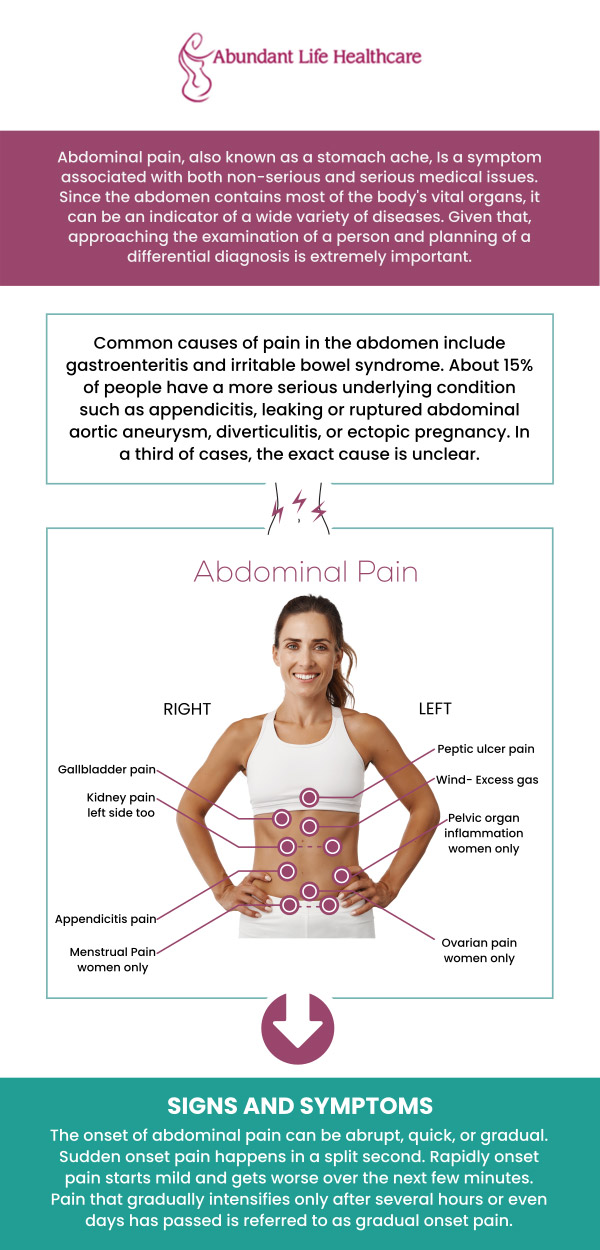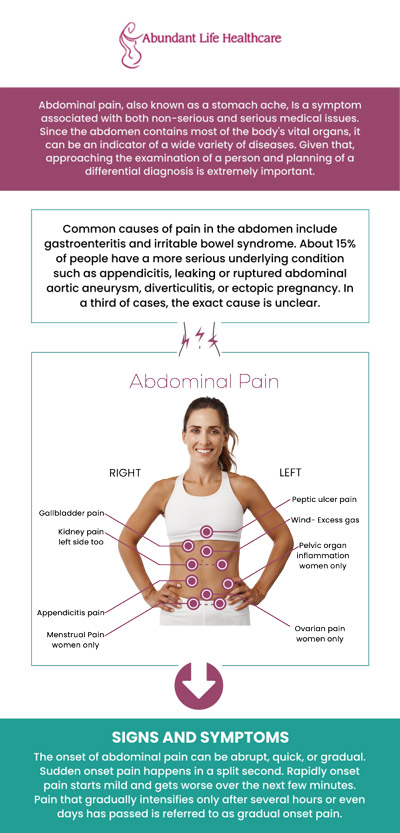What Causes Lower Abdominal Pain in Females?
At Abundant Life Healthcare, we provide compassionate evaluation and care for women experiencing lower abdominal pain. Dr. Marc Jean-Gilles, DO, FACOG, focuses on identifying underlying gynecological concerns and guiding patients toward appropriate treatment options for their well-being. For more information, contact us or book an appointment online. We are conveniently located at 601A Professional Drive, Suite 370, Lawrenceville, GA 30046.


Table of Contents:
Can menstruation lead to lower abdominal pain and pelvic pain in women?
Is lower abdominal pain in women a sign of endometriosis?
What infections cause lower abdominal pain in women?
Can ovarian cysts lead to lower abdominal pain and pelvic pain in women?
Lower abdominal and pelvic pain during menstruation—commonly known as menstrual cramps or dysmenorrhea—can significantly impact your quality of life. These pains typically occur just before or during your period, as the uterus contracts to shed its lining. Hormone-like substances called prostaglandins are responsible for triggering these contractions, and as a result, discomfort can range from mild to severe.
While menstrual pain is a common experience for many women, each individual’s symptoms are unique. If your pain is unusually intense, persistent, or accompanied by other symptoms, it could be a sign of an underlying condition such as endometriosis or uterine fibroids.
Lower abdominal pain in women can be concerning and disruptive to daily life. One possible cause of this pain is endometriosis—a condition in which tissue similar to the lining of the uterus grows outside the uterus, often resulting in cramping or aching pain in the lower abdomen or pelvis, especially during menstrual periods. However, it’s important to remember that endometriosis is just one of many potential causes of lower abdominal pain.
Other conditions, such as ovarian cysts, menstrual cramps, pelvic inflammatory disease, urinary tract infections, irritable bowel syndrome, or gastrointestinal issues, can also lead to similar symptoms. Pain from endometriosis often intensifies during menstruation, but it can occur at other times and may be accompanied by heavy periods, pain during intercourse, discomfort with bowel movements or urination, and sometimes infertility.
At Abundant Life Healthcare, our experienced providers are dedicated to helping women find answers and relief. Our team will provide a thorough evaluation, which may include a physical exam, advanced imaging, and if needed, minimally invasive procedures, to accurately diagnose the cause of your pain—whether it is endometriosis or another condition.
Early diagnosis and tailored treatment are key to alleviating symptoms and improving your quality of life.
Many lower abdominal pain causes are related to infections of the reproductive or urinary systems, which require careful evaluation and prompt treatment to protect your health and well-being.
Sexually transmitted infections (STIs), such as chlamydia and gonorrhea, are common culprits of lower abdominal pain. If left untreated, these infections can ascend from the cervix into the upper reproductive tract, leading to pelvic inflammatory disease (PID). PID is a significant cause of lower abdominal pain and may also present with fever, abnormal vaginal discharge, or discomfort during intercourse.
Urinary tract infections (UTIs) are another frequent source of lower abdominal discomfort. UTIs often involve the bladder and are characterized by symptoms like urinary urgency, burning during urination, and pain in the lower abdomen.
Other possible causes include vaginal infections like bacterial vaginosis or trichomoniasis. While these typically cause vaginal irritation and abnormal discharge, they may occasionally contribute to lower abdominal discomfort. Less commonly, infections of the digestive tract, such as gastroenteritis, can also cause abdominal pain, usually accompanied by symptoms like diarrhea or vomiting.
Ovarian cysts—fluid-filled sacs that develop on or within the ovaries—are a common issue among women of reproductive age.
Recognizing the Symptoms
One of the most frequently reported signs of ovarian cysts is lower abdominal or pelvic pain. This discomfort may be a dull ache or a sharp, sudden pain, often on one side of your lower abdomen. You might notice pain that comes and goes, especially during or after your menstrual cycle, sexual activity, or exercise. Some women also report sensations of fullness, pressure, or bloating in the pelvic area.
In rare cases, a large cyst, or one that ruptures or causes the ovary to twist (ovarian torsion), can lead to severe, sudden pain. This is a medical emergency and requires immediate attention.
Our Approach at Abundant Life Healthcare
Many ovarian cysts cause no symptoms and are often discovered during routine pelvic exams or imaging studies at our clinic. However, any persistent or severe pelvic pain should be evaluated by a healthcare professional. At Abundant Life Healthcare, our experienced providers offer comprehensive evaluation and personalized treatment options, ensuring you receive the highest quality care.
If you have concerns about pelvic pain or think you may have an ovarian cyst, schedule an appointment with Abundant Life Healthcare. Our compassionate team is dedicated to supporting your health at every stage of life. For more information, contact us or book an appointment online. We are conveniently located at 601A Professional Drive, Suite 370, Lawrenceville, GA 30046. We serve patients from Lawrenceville GA, Suwanee GA, Snellville GA, Duluth GA, Dacula GA, Lilburn GA, Loganville GA, Auburn GA, and surrounding areas.
Check Out Our 5 Star Reviews


Additional Services You May Like

Additional Services You May Like
- Obstetrics
- Pregnancy
- Gynecologist
- Birth Control
- Labiaplasty
- Microblading
- Weight Loss
- Semaglutide GLP-1
- Pap Smears
- Pelvic Pain
- Laser Hair Removal
- In House Ultrasound (Including 3D)
- Vaginal Birth After C-Section (VBAC)
- Pregnancy As High Risk
- Multiple Gestations
- Postpartum Counseling
- 24hour/365days On Call Service
- Annual Exam
- Abnormal Uterine Bleeding
- Management Of Endometriosis
- Ultrasound
- Pelvic Organ Prolapse
- Urinary Incontinence
- Perimenopause And Menopause
- Sexual Dysfunction
- Fat Freeze (Like Cool Sculpting)
- Body Contouring
- Ozempic
- Civil Surgeon
- Hormone Replacement Therapy
- Immigration Medicine
- Biote Hormone Pellets
- GLP-1
- Peptide Therapy




